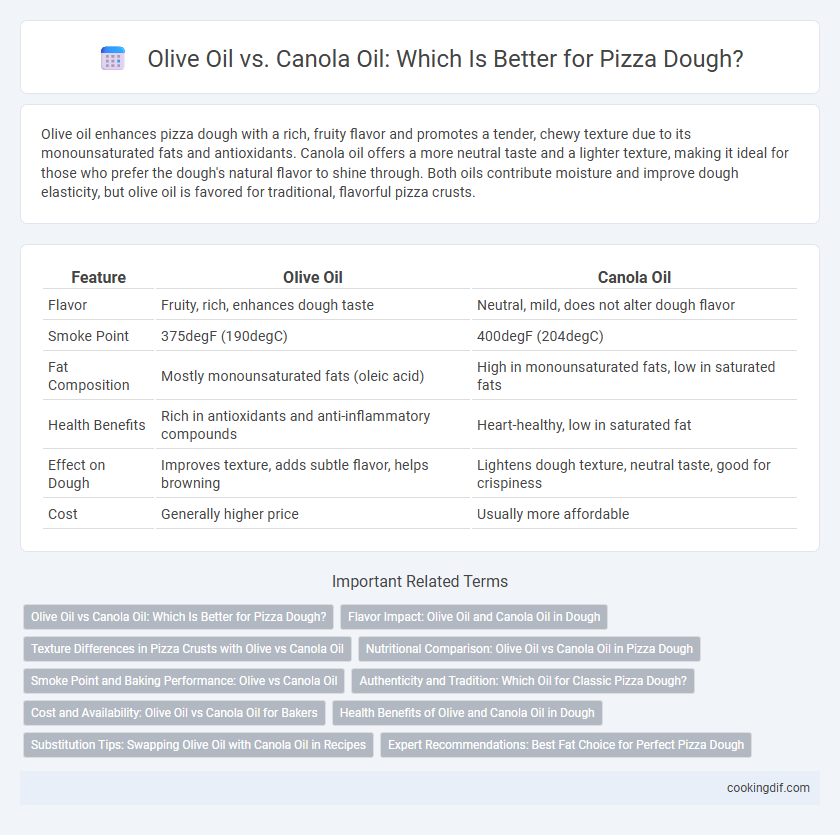Olive oil enhances pizza dough with a rich, fruity flavor and promotes a tender, chewy texture due to its monounsaturated fats and antioxidants. Canola oil offers a more neutral taste and a lighter texture, making it ideal for those who prefer the dough's natural flavor to shine through. Both oils contribute moisture and improve dough elasticity, but olive oil is favored for traditional, flavorful pizza crusts.
Table of Comparison
| Feature | Olive Oil | Canola Oil |
|---|---|---|
| Flavor | Fruity, rich, enhances dough taste | Neutral, mild, does not alter dough flavor |
| Smoke Point | 375degF (190degC) | 400degF (204degC) |
| Fat Composition | Mostly monounsaturated fats (oleic acid) | High in monounsaturated fats, low in saturated fats |
| Health Benefits | Rich in antioxidants and anti-inflammatory compounds | Heart-healthy, low in saturated fat |
| Effect on Dough | Improves texture, adds subtle flavor, helps browning | Lightens dough texture, neutral taste, good for crispiness |
| Cost | Generally higher price | Usually more affordable |
Olive Oil vs Canola Oil: Which Is Better for Pizza Dough?
Olive oil enhances pizza dough with a rich flavor and chewy texture, thanks to its high monounsaturated fat content and antioxidants. Canola oil, with a milder taste and higher smoke point, offers a lighter texture and better heat tolerance but lacks the distinct flavor profile of olive oil. For artisanal pizzas emphasizing taste and traditional texture, olive oil is preferred, while canola oil suits recipes requiring a neutral taste and higher baking temperatures.
Flavor Impact: Olive Oil and Canola Oil in Dough
Olive oil imparts a rich, fruity aroma and slightly peppery flavor to pizza dough, enhancing the overall taste and creating a more authentic Mediterranean profile. Canola oil offers a neutral flavor that does not alter the dough's flavor, making it suitable for those who prefer a more subtle or traditional pizza taste. The choice between olive oil and canola oil significantly affects dough texture and flavor, with olive oil often preferred for its distinctive and robust flavor impact.
Texture Differences in Pizza Crusts with Olive vs Canola Oil
Olive oil enhances pizza dough texture by creating a tender, slightly chewy crust with a rich, fruity aroma due to its monounsaturated fats and antioxidants. Canola oil contributes to a lighter, softer crust with a more neutral flavor, owing to its higher polyunsaturated fat content and lower saturation. The choice between olive and canola oil directly affects the crust's elasticity, crispness, and overall mouthfeel, influencing the final pizza experience.
Nutritional Comparison: Olive Oil vs Canola Oil in Pizza Dough
Olive oil and canola oil differ significantly in their nutritional profiles for pizza dough preparation. Olive oil is rich in monounsaturated fats and antioxidants like vitamin E and polyphenols, which promote heart health and reduce inflammation. Canola oil contains more omega-3 fatty acids and has a lower saturated fat content, making it a heart-healthy option but with fewer antioxidants compared to olive oil.
Smoke Point and Baking Performance: Olive vs Canola Oil
Olive oil has a smoke point around 375degF (190degC), which is slightly lower than canola oil's smoke point of approximately 400degF (204degC), making canola oil more resistant to high heat during baking. Olive oil imparts a richer flavor and contributes to a softer, chewier dough texture, while canola oil's neutral taste allows the dough's natural ingredients to shine without added flavor. Both oils enhance dough elasticity, but olive oil tends to produce a more tender crumb, whereas canola oil offers a crispier crust due to its higher smoke point.
Authenticity and Tradition: Which Oil for Classic Pizza Dough?
Olive oil is the traditional choice for classic pizza dough, prized for its rich flavor and Mediterranean authenticity that enhances the overall taste and texture. Canola oil, while neutral and cost-effective, lacks the distinctive, fruity notes essential to maintaining the authentic profile of traditional Italian pizza crusts. Using extra virgin olive oil aligns with heritage recipes and ensures the dough's moisture and elasticity reflect timeless pizza craftsmanship.
Cost and Availability: Olive Oil vs Canola Oil for Bakers
Canola oil is significantly more affordable and widely available than olive oil, making it a cost-effective choice for bakers managing large dough batches. Olive oil, while offering superior flavor and health benefits, is pricier and may be less accessible in bulk quantities, impacting bakery margins. Selecting canola oil supports budget-conscious production without sacrificing dough texture, whereas olive oil suits premium or artisanal pizza dough where cost is less critical.
Health Benefits of Olive and Canola Oil in Dough
Olive oil is rich in monounsaturated fats and antioxidants, which contribute to heart health and reduce inflammation, making it a superior choice for dough fat. Canola oil contains a high amount of omega-3 fatty acids and has a neutral flavor, promoting cardiovascular benefits while maintaining dough softness. Both oils enhance dough texture, but olive oil's nutritional profile provides greater long-term health advantages.
Substitution Tips: Swapping Olive Oil with Canola Oil in Recipes
Canola oil serves as a neutral-flavored substitute for olive oil in pizza dough recipes, maintaining moisture and tenderness without altering the dough's taste profile. When swapping olive oil with canola oil, use a 1:1 ratio to ensure consistent texture and elasticity in the dough. Choose canola oil to reduce strong flavor notes while preserving essential fat content for perfect dough structure.
Expert Recommendations: Best Fat Choice for Perfect Pizza Dough
Experts recommend olive oil over canola oil for pizza dough due to its superior flavor profile and ability to enhance gluten development, resulting in a chewier texture. Olive oil's high monounsaturated fat content contributes to a tender crust and rich aroma, favored by professional pizzaiolos. Canola oil's neutral taste and lower polyphenol levels are less effective in achieving the characteristic robust flavor of authentic Italian-style pizza dough.
Olive oil vs canola oil for dough fat Infographic

 cookingdif.com
cookingdif.com